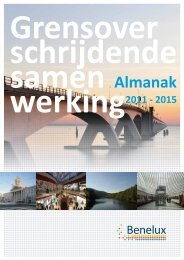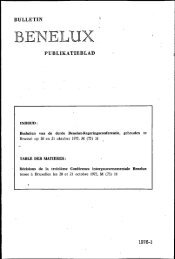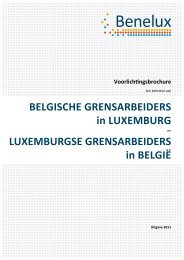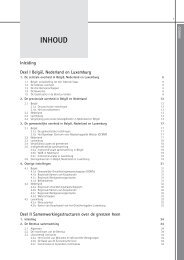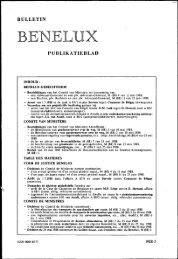The North Seas Countries' Offshore Grid Initiative - Initial ... - Benelux
The North Seas Countries' Offshore Grid Initiative - Initial ... - Benelux
The North Seas Countries' Offshore Grid Initiative - Initial ... - Benelux
You also want an ePaper? Increase the reach of your titles
YUMPU automatically turns print PDFs into web optimized ePapers that Google loves.
<strong>The</strong>refore, if future targets are likely to involve increased volumes of offshore RES that<br />
those assumed in the Reference scenario, there may be significant benefit in adopted a<br />
more integrated, meshed approach to grid design. This result was also found in [12]<br />
<strong>The</strong>se two and also other studies on future RES integration [15] -[18], [21]; [23] usually<br />
assume an absence of regulatory barriers, which is not yet the case in reality. <strong>The</strong> findings<br />
of the RES+ sensitivity reinforce the requirement for NSCOGI to further cooperate on<br />
pathways to mitigating existing barriers.<br />
6.1.6 Future Work Stream<br />
It is proposed to continue work in NSCOGI with special focus on assessing scenarios<br />
produced with a common foundation, analysing additional sensitivities and considering<br />
the barriers as far as possible, on real life characteristics.<br />
6.1.6.1 Development of common scenarios<br />
As described in Chapter 1.1.7 ENTSO-E will continue to work on the scenario-based<br />
approach where four scenarios are being developed in the framework of the next<br />
TYNDP(s) to come. <strong>The</strong>se scenarios are discussed with external stakeholders.. <strong>The</strong> NSCOGI<br />
forum could serve as a valuable forum for consultation already at an early stage and<br />
during developing the scenarios. It would increase the value of the TYNDP even further, if<br />
the scenarios are understood and as far as possible agreed by all NSCOGI stakeholders as<br />
an appropriate foundation also to be considered for future NSCOGI work.<br />
This scenario based approach differs from the collection of best views used in this study<br />
and takes the uncertainty around a common Regional / European target for 2030 into<br />
account.<br />
6.1.6.2 Possible sensitivities on a scenario<br />
To investigate the robustness of a scenario, single parameters can be changed. For this<br />
study, the amount of offshore RES has been significantly increased, as described in 6.1.5.<br />
Other possible sensitivities, which could be worth investigating on a next scenario are<br />
described below, - in case they are not already being taken into account as part of the four<br />
scenarios to be developed (see 6.1.6.1).<br />
CO 2 prices<br />
CO prices have substantial influence on the eventual fuel mix. A sensitivity analysis on<br />
2<br />
the assumed CO prices may address the mismatches between the merit order (fuel mix)<br />
2<br />
presently observed in some countries with those of the Reference Scenario. A ‘gas before<br />
coal’ merit order would require substantially higher CO prices. A sensitivity analysis on<br />
2<br />
CO prices may also address the mismatch between CO prices in the Reference Scenario<br />
2 2<br />
and those observed over the past period on the ETS-market. In order to substantially<br />
reduce the workload of this ‘Merit Order Change’ sensitivity analysis, some limitation in<br />
scope of the analysis is required.<br />
Page 63 of 142




